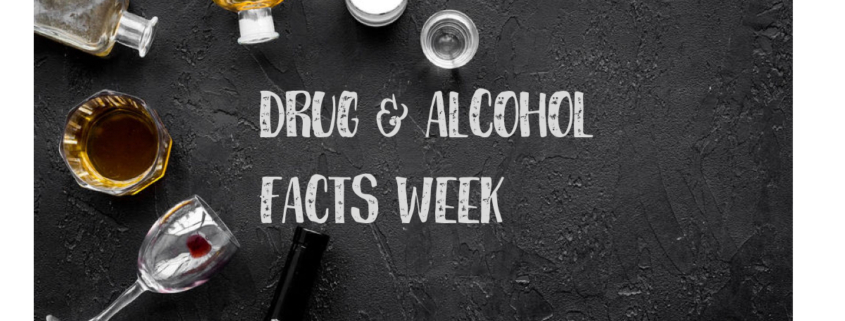Alcohol Facts
Drug & Alcohol Facts Week
By Brandon Bolton, RDN |Nutrition Educator
This week is Drug and Alcohol Facts Week; a time to share facts and awareness about drugs and alcohol with our communities. This article will take a closer look at the truth about alcohol.
According to the 2019 National Survey on Drug Use and Health, 86% of people 18 and older said they drank alcohol at some point in their lifetime, 69.5% reported that they drank in the past year, and 55% reported that they drank in the past month.
What is binge drinking?
What is more serious, is that this survey also showed that 26% of people 18 and older reported that they engaged in binge drinking in the past month. Binge drinking is a pattern of drinking that brings blood alcohol level to 0.08%, also usually looks like 5+ drinks for men, 4+ drinks for women at one setting (night out, at a party, etc.) in about a 2-hour timeframe.
What is heavy drinking?
Heavy drinking is considered 15+ drinks for men, 8+ drinks for women each week. The difference between binge drinking and heavy drinking is that binge drinking is a large amount in a very short time. Heavy drinking is a higher than healthy amount on a regular basis.
Bottom line
Drinking too much alcohol can lead to poor overall health. People who drink too much alcohol are also be more likely to eat poorly. Alcohol can also affect digestion and how your body absorbs nutrients. Too much alcohol can lead to deficiencies in important vitamins like B-complex and many more.
My advice
Talk to your doctor or medical provider to see if it is safe for you to drink alcohol. If you do choose to have alcohol, drink in moderation. Drinking less is better for overall health than heavy drinking or binge drinking. The CDC describes safe, moderate alcohol consumption for most adults as 2 drinks or less for men, and 1 drink or less for women per day.
But make sure you understand what is considered 1 drink.
- 12 ounces of beer (5% alcohol content)
- 8 ounces of malt liquor (7% alcohol content)
- 5 ounces of wine (12% alcohol content)
- 1.5 ounces or a “shot” of 80-proof (40% alcohol content) distilled spirits or liquor (e.g., gin, rum, vodka, whiskey)
Following these guidelines will support good nutrition, and that plays an important role in your health. Following nutrition guidelines and eating a balanced diet can help ensure our bodies are getting all the nutrients to keep us feeling healthy both physically and emotionally.
Good nutrition means:
- Eat a wide variety of foods.
- Make half your plate fruits and vegetables.
- Half of your grains coming from whole grains like 100% whole wheat bread, oatmeal, brown rice, and quinoa.
- Vary your protein and eat protein rich foods like:
- Lean meats: 95% lean ground beef, pork tenderloin, skinless chicken or turkey (limit red meats to one time per week)
- Fish such as salmon and tuna at least once per week
- Eggs
- Nuts, seeds, tofu, tempeh, edamame
- Legumes such as beans, lentils, and chickpeas
- Switch to low fat or fat-free dairy milk or yogurt.
- Limit sugar-sweetened beverages.
- Aim for 30 minutes of moderate physical activity 5 days per week.
Living a healthy life means considering the many ways we can improve and maintain our health. Alcohol can be safely consumed for most adults, but moderation is important. Reducing or eliminating alcohol from your diet is a great way to improve your overall health. To learn more, call NOAH at 480-882-4545, or fill out this form to meet with one of our Registered Dietitian Nutritionists.




